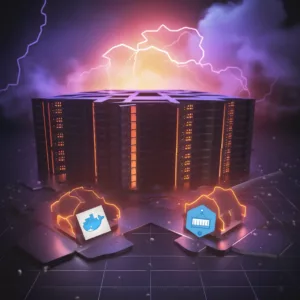Posts Tagged ‘containers’
Serverless Architecture with Docker and IronWorker
Are you a developer struggling with managing servers, dealing with scaling issues, or simply looking to cut costs? Then this guide is for you. Dive into the world of serverless architecture with the powerful duo of Docker and IronWorker. This article explores their synergy, and providing insights that could revolutionize your development process. 5 key…
Read MoreHow to Create a Docker Container?
App development and deployment now needs to be slicker and simpler than ever. To stay ahead of the competition, you need to be able to get your app up and running quickly without a ton of conflict issues or worrying that problems will arise depending upon which device is running it. That’s where the Docker…
Read MoreDocker vs. AWS AMI: What’s the Difference?
Docker and AWS AMI are two terms you might come across in application development. What are the differences between them? A simple explanation: Docker is an open-source platform that develops and runs applications. An Amazon Machine Image (AMI) is a supported Linux image provided by Amazon Web Services (AWS.) In short, open-source platform vs. Linux image. The differences run much deeper than this. Read on to learn the variations between Docker vs. AWS AMI.…
Read MoreAWS Fargate vs. Azure Containers
AWS Fargate and Azure Containers make it easier for developers to focus on building applications instead of managing IT infrastructures. Containers operate as independent runtime environments with their own configurations, libraries, and frameworks. These features make software more dependable because containers do not rely on specific operating systems. Anyone can access and use them regardless…
Read MoreAWS Fargate vs Cloud Foundry
Your container management decision could make or break your application performance! Don’t risk missing out on the perfect solution. Our detailed comparison of AWS Fargate vs Cloud Foundry is designed to help you find a feature-rich, budget-friendly option. It’s more than a choice, it’s your path to application excellence. Don’t wait, dive in now! You…
Read MoreMonitor ECS Applications on AWS Fargate With Datadog
Datadog and AWS Fargate together allow users to collect real-time, detailed ECS metrics about the containerized tasks they run. With Datadog Autodiscovery, you can even autodetect containerized services that use Fargate to configure the Datadog Agent for those services with no API or manual changes necessary. Iron’s serverless tools can bring you a greater level of flexibility,…
Read MoreAWS Lambda vs. Fargate Containers | IronWorker
Docker container technology is open source, which means it’s possible to deploy your containers on a range of platforms. Both AWS Fargate and Lambda support Docker images, albeit in slightly different ways. So, how do you know which one to use?
Read MoreContainers vs. Serverless Computing
The five key differences between containerization and serverless computing: Cost — You must pay for serverless environments hosted in the cloud, whereas a container can be set up for free. However, containers have ongoing management costs, which can be expensive — even if no one is using the application. Longevity – Serverless functions live short, which also provide agility and flexibility. Containers…
Read MoreWhat Is CaaS (Containers as a Service)?
Overview CaaS, which stands for containers as a service, has been growing in popularity over the last decade as more organizations look for ways to control tasks while leveraging the benefits of technology. CaaS takes uses cloud technology to control containers. Containers are applications that contain all of the code and libraries that they need…
Read More

